Anime fans like to argue. A lot. Sometimes I think we spend more time debating anime than actually watching anime. Today I’d like to focus on a point of contention that every anime fan will inevitably face (unless you speak Japanese) and one that I feel is the single biggest debate in all of anime: Sub vs Dub.
[A famous clip from the anime “Bobobo-bo Bo-bobo” poking fun at the debate]
In short, Sub vs Dub refers to either the use of subtitles (Sub) with the original Japanese audio or the use of English, or other language-speaking, voices dubbed on top of the anime (Dub). Though it sounds simple, wars have been waged on this topic.

The anime “Cowboy Bebop” an anime with a Dub that is famously better than the SubThe obvious draw for Dub is that, well, we speak English and not Japanese (Side Note: for simplicity’s sake I’m going to refer to any language other than Japanese as English, given that this is an English class). So, if you want the voices to make any etymological sense, then only Dub can give you that. Beyond that, Dub allows you to understand the emphasis placed on certain words, which can be challenging to determine from reading a subtitle. Additionally, there are mannerisms unique to English speakers that are different than Japanese speakers. At times, these cultural connections can add to the emotional impact of a scene.

On the other hand, staunch supporters of Sub typically argue that using subtitles and retaining the original Japanese audio allows for a more emotional and authentic viewing experience. The voice acting for the original Japanese audio is, for the most part, generally accepted to be better than the English dub. This is due to the fact that Japanese voice acting studios typically have much more funding and time to work on a show than an English dub team. There are far less English voice actors for anime than Japanese ones, leading to voice actors being spread thin amongst multiple projects and lowering the quality of their work.
Further, the language barrier can play a role in weakening an English dub. Dubbing over an entire show in a different language is not easy. First, dubbing teams must painstakingly watch over every scene and make note each time a character’s mouth moves. The rule is to only speak when your character on screen is speaking. Next, they have to translate the Japanese voice acting into English. Finally, scriptwriters have the vexing task of reconciling the translation and their allotted syllables into a final, passable script. As you could probably guess, this can lead to precious meaning being lost, regardless of the skill of the voice actors or scriptwriters.
Personally, I stand proudly in the Sub camp. However, whether it’s through Sub or Dub, enjoying anime however you want is the most important.
Be First to Comment